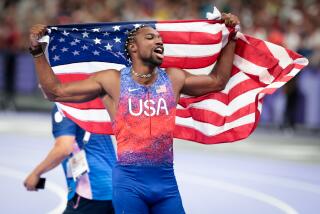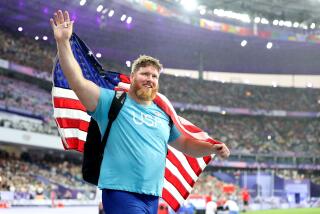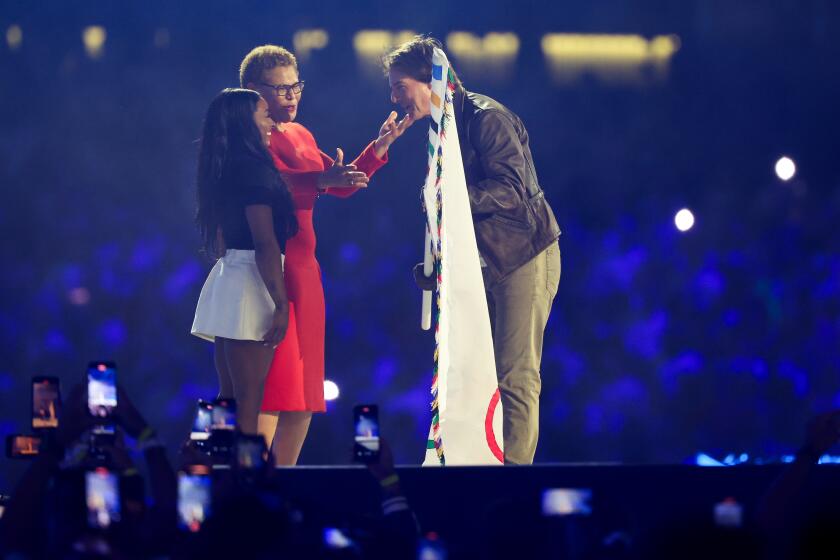Wykoff, Houser Had the Mettle to Earn Their Medals
One of them was once known as “The World’s Fastest Human.”
The other was the last man to win the shotput and discus in the same Olympics.
One of them won four state titles during his prep career at Glendale High.
The other won a record six state boys’ titles at Oxnard.
Together, Frank Wykoff and Clarence “Bud” Houser put their hometowns on the athletic map in the 1920s.
Wykoff, once described in the Glendale News-Press as the town’s “fair-haired boy with a choir-boy face and a record for attending Sunday School as good as he had on the track,” burst onto the national scene in 1928. He won the 100- and 200-meter dashes in the Southwest Olympic trials at the Coliseum a day after graduating from high school.
Wykoff tied the world record in the 100-yard dash with a 9.5 clocking during his senior year at Glendale, but his victories shocked the track experts of the time who figured he was too inexperienced to win against a field that included Charley Paddock, the 1920 Olympic champion in the 100 and a two-time silver medalist in the 200.
The News-Press ran a story with the headline, “Glendale Greyhound Downs Fastest Field of Sprinters Ever Grouped in Southwest Olympic Finals.”
The story by Sports Editor Dan Ashbaugh overflowed with prose in the journalistic style of that era.
“Youth will be served,” read the first sentence. “Ask Charles William Paddock. Mr. Paddock looked twice upon the flying rear end of Frank Wykoff’s cardinal track jersey Saturday at the Southwest Olympic finals. Yesterday, the newspapers of the world carried black-faced eight-column headlines proclaiming the fact that an 18-year-old high school boy had twice trimmed the “world’s fastest human.”
“Not only was Paddock defeated but the erstwhile practically unknown local youth tied two recognized world’s records when he did it. The “experts” had practically all said that the Glendale youngster wasn’t in the same class with the older, more experienced sprinters.
“Ask Mr. Paddock!
“Ask any of the 50,000 rabid track fans who saw it!”
Wykoff, who ran 10.4 in the 100 and 20.8 in the straightaway 200 that day, was treated like royalty after that.
A News-Press story noted that the “fastest going human in the fastest growing city” was made an honorary member of the city council less than a week after his victories.
Another made light of the fact that the “world’ fastest human” was pulled over for driving 30 in a 15-miles per hour speed zone.
A third detailed how the city council was raising money so Glendale track coach Normal Hayhurst could accompany Wykoff to Amsterdam for the Olympic Games.
A fourth noted a local company was going to send several gallons of bottled water to Amsterdam so Wykoff and Hayhurst wouldn’t have to scramble to find quality drinking water as many American tourists did at the time.
Unfortunately for Wykoff, he didn’t run as well in the Olympics as he had in the trials.
Whether it was the 10 pounds he gained on the cruise overseas or the “spongy” track that wasn’t to his liking, Wykoff finished fourth in the 100 in 11.0 as Canadian Percy Williams placed first in 10.8.
Wykoff didn’t come home empty handed, however, running the first leg on the 400 relay team that placed first in 41.0 to tie the world record.
Wykoff attended Glendale College for a year before transferring to USC, where he was credited with being the first sprinter to run 9.4 for 100 yards in 1930.
That record wouldn’t be broken until Mel Patton of the U.S. ran 9.3 in 1948, but Wykoff never medaled in the 100 in the Olympic Games.
He won two NCAA and two AAU titles in the 100, but he failed to make the Olympic team in the 100 in 1932. He ran 10.6 to place fourth in the 1936 Olympics, but that left him three-tenths of a second behind winner Jesse Owens of the U.S.
Wykoff anchored 400 relay teams that set world records of 40.0 in the 1932 Games in Los Angeles and 39.8 in the 1936 Games in Berlin.
Wykoff, who was 70 when he died of emphysema in 1980, is the only sprinter to run on three Olympic champion relay teams.
Houser, a teammate of Wykoff’s in the 1928 Olympics, competed in baseball, basketball and track in high school.
He was raised by his oldest sister in what was then the small, rural community of Oxnard.
He was freshman class president at Oxnard High in 1919 and won the shotput and discus in the 1920 state championships as a sophomore.
Houser repeated those titles in the 1921 and 1922 state championships before attending USC.
He won three AAU titles in the discus and two in the shotput during his career and set a world record of 158-1 3/4 in the discus in 1926.
But he is best known for winning the shotput and discus in the 1924 Olympics in Paris and placing first in the discus in the 1928 Games in Amsterdam.
A self-described emotional man, the 6-foot-1, 187-pound Houser almost failed to qualify for the discus final in the 1928 Olympics.
Competing on a cold and rainy day, Houser threw only 95 feet on his opening toss after slipping in the ring which was dirt--not cement--in those days.
His second throw was only 110 feet and left him about 30 feet short of qualifying for the 12-man final.
He gathered himself for his third--and final--qualifying attempt and unleashed an Olympic record throw of 155-3 that carried over to the final and gave him his third gold medal.
“I stopped a moment and offered a silent prayer just to collect myself,” Houser told an Oxnard Elks Club audience in 1967.
“Later, as I stood on the victory stand, listening to the Star Spangled Banner, I was the happiest kid in the world. And the tears were running down my face.”
Phil Philbrook, a former teammate of Houser’s at Oxnard, told the Oxnard Press-Courier in 1983 that Houser had a “will to win”, but that “nothing ever went to his head.”
Lucy Thiel, whose husband August was one of Houser’s best friends in high school, described Houser as an introvert who took his accomplishments in stride.
“You wouldn’t want to know a better person,” she told the Press-Courier.
“He took what he got and he was very proud of it.”
Houser was 93 when he died of natural causes in 1994. He was the oldest living Olympic champion at that time.
More to Read
Go beyond the scoreboard
Get the latest on L.A.'s teams in the daily Sports Report newsletter.
You may occasionally receive promotional content from the Los Angeles Times.








